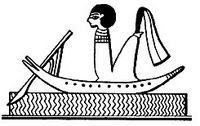Portrayal of Jesus is "artful, layered and intelligent"
In his blog post "A new way of translating Matthew: 5:13-16", Bill Tammeus writes about Thomas Moore's new book GOSPEL The Book of Matthew: A New Translation with Commentary, Jesus Spirituality for Everyone.
Earlier this month for The Presbyterian Outlook, Roy Howard's review of GOSPEL The Book of Matthew: A New Translation with Commentary, Jesus Spirituality for Everyone includes:
Barque coverage
15 May 2016 "Translation and commentary may be challenging"
"One of Moore's translation choices that I found challenging and, at first, off-putting, was to use "Sky Father" for God. I thought it played into the annoying practice of some of the more aggressive atheists these days to dismiss God as an imaginary "Sky Daddy," as they sometimes write.
But Moore says he prefers 'to use the word 'sky' instead of 'heaven' because it is a concrete image. I do not mean a literal father in the clouds but rather the sky as an image for spirit... Our usual anthropomorphic — human-like — language is only an approximation of the sublime mystery of this father.'
Still, most readers, I'm guessing, will find it strange, if not difficult, to begin Matthew's version of the Lord's Prayer in chapter 6 the way Moore translates it: 'Our father in the sky...'
Moore notes that Matthew's portrayal of Jesus is 'artful, layered and intelligent,' but, he says, "you have to think in layers and metaphors and cannot be simplistic when you read him.' Exactly right."Tammeus also comments on Moore's associations with resurrection. He writes:
"In a footnote, Moore quotes Donald Spoto's book, The Hidden Jesus: A New Life, as saying that "When we say Jesus has risen from the dead, we do not mean that his corpse was resuscitated and that he came back to the same kind of life as we know it; that, after all, would be only a return to impermanence and an orientation to death. ... Jesus has entered into a new and permanent manner of existence — immortal, deathless, no longer limited by our categories of space and time."
... Then Moore expands that thinking by adding this: 'We are all resurrected when we 'get up' from the darkness and stupor of our unconsciousness and acting-out. We live an entirely new kind of existence.' Which, while not disputing the resurrection of Jesus, tends to diminish the eternal nature of resurrection that many people have in mind when they refer to the term."Timmeaus has no argument when Moore points out "Jesus describes God as 'not the God of the dead, but of the living.'"
Earlier this month for The Presbyterian Outlook, Roy Howard's review of GOSPEL The Book of Matthew: A New Translation with Commentary, Jesus Spirituality for Everyone includes:
"In this book [Moore] declares, 'My intention is to release the Gospels from their narrow confinements and show how valuable they are today to anyone at all looking for insight into how to live deeply and lovingly.
... That intention – 'to help people live deeply and lovingly' – guides Moore’s translation at several points including his use of the phrase 'tragic mistake' for 'sin.' There are other choices that may offend some readers and lead others to dismiss him altogether. Yet, for those who are not threatened by a fresh conversation with Matthew and Moore about what it means to be a follower of Jesus in our time, this is a book worth pondering."Howard concludes, "One does not have to agree with Moore at every point to gather the fruit of his new effort."
Barque coverage
15 May 2016 "Translation and commentary may be challenging"



